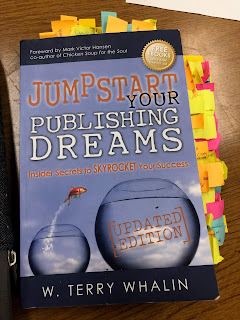By Terry Whalin (@terrywhalin)
After working with hundreds of authors on their books for decades as well as writing more than 60 nonfiction books for traditional publishers, I understand every book (of any type) has challenges to complete. The challenges are on multiple levels whether your book is for young readers or adults.
Last month I wrote about why I’m still blogging. Writing a blog is a fun way to capture your thoughts and also build an audience to attract publishers. Since 2008, I’ve been blogging and have a massive amount of content (over 1,600 entries). Years ago, I was aware of the large volume of content in my blog. I decided to take this writing, organize it into themes (or chapters) and create a nonfiction book. I did this creative process on my own initiative. After the fact, I discovered it was something others have successfully done with their blog content. Within the publishing industry, someone created a word for the process: Blook—where the content of a blog becomes a book.
A Bunch of Blog Posts Do Not Mean You Have a Book
It’s wonderful to have pages of content but that alone doesn’t mean you have a book. There are a series of questions which need to be answered:
Are these posts focused on the right audience? Is it an audience you can reach or are reaching? Every book needs readers. Thousands of new books enter the marketplace every day. Your book must be for a particular reader because no book is for “everyone.” New writers often include the “everyone” audience in their pitch—and if you have it, eliminate it because the editor or agent will probably roll their eyes and be likely to reject.
Can you organize the posts into themes (or chapters)? I looked at the various chapters as a long magazine article. Each chapter needs to have an interesting title, a solid beginning, middle and ending with a singular focus for the reader.
Create A Distinctive Book
Can you create some distinctions with your book to make it stand out from others?
I asked Mark Victor Hansen, co-author of Chicken Soup for the Soul to write the foreword. In fact, I drafted a foreword for Mark to read and approve (which he did). As a writer, you have to make it easy for the person you are asking to say, “yes.” I have more detail about this process of getting endorsements in this link.
I created a button on the front with $84 of Free Ebooks of additional value for the reader.
I selected and purchased cartoons for every other chapter to add to the interior appeal.
I created two reader applications sections at the end of each chapter: Dig Deeper and Awaken Your Dreams.
These features are only a few of what I built into the fiber of this book.
There are numerous questions that you as the author have to answer in this process. Originally I self-published Jumpstart Your Publishing Dreams and sold several thousand copies. I worked through a number of other questions in the self-publishing process. I made sure I created a high-quality product which I would compare to anything from a traditional publisher (an important distinction). Then a few years ago I released an updated edition with Morgan James Publishing. The book continues to help many people. Recently a reader sent me an image where he had marked his book as he read it.
Without question, blooks take work to organize and pull together. My friend editor and writing coach Nina Amir gives a lot more detail in her book, How To Blog A Book (Writers Digest Books).Every kind of book takes careful effort and creativity to pull together into a single product. Making a “blook” is another way to accomplish this process. Have you used this technique? How did it work out for you? Let me know in the comments below.
Tweetable:
________________________________________
W. Terry Whalin, a writer and acquisitions editor lives in Colorado. A former magazine editor and former literary agent, Terry is an acquisitions editor at Morgan James Publishing. He has written more than 60 nonfiction books including Jumpstart Your Publishing Dreams and Billy Graham. Get Terry’s recent book, 10 Publishing Myths for only $10, free shipping and bonuses worth over $200. To help writers catch the attention of editors and agents, Terry wrote his bestselling Book Proposals That $ell, 21 Secrets To Speed Your Success. To download a free copy, click the book link or the image. Check out his free Ebook, Platform Building Ideas for Every Author. His website is located at: www.terrywhalin.com. Connect with Terry on Twitter, Facebook and LinkedIn.



















